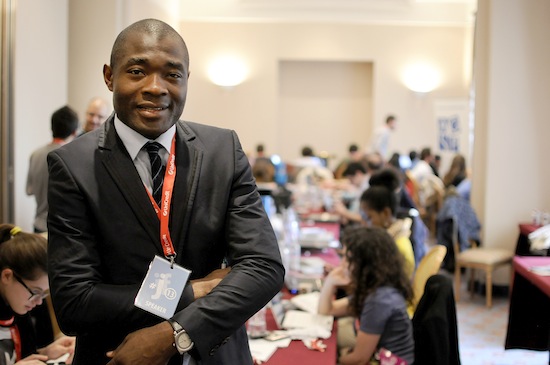Exiled Journalist Pioneers Diversity in Italian Media
A month ago, Jean-Claude Mbede became the first black journalist and the first exile to work as a professional journalist in Italy. “It was very difficult to join Italy’s National Order of Journalists,” said Mbede. “I’ve been fighting for three years to get that recognition.”
In Cameroon Mbede worked as an editor in chief and a news anchor. In 2000, he became the head of the press office for Cameroon’s national soccer team. But over five years ago, Mbede was forced to flee Cameroon for Italy after reporting on corruption in the government. “Because of my work as a journalist, I was in danger. I feared for my life, so I fled,” said Mbede. “When you escape, you don’t choose your destination, you only think about surviving.”
When Mbede arrived in Italy, he didn’t know a single word of Italian. “When I arrived, everything was so difficult. I wrote a letter to the Italian President explaining the situation in my country. He was so impressed with my gusto, he sent me a check for 2,000 Euros to help me start a new career in Italy.”
Today, this 36-years-old exile from Cameroon is the founder and editor of afrikaitalia.it, a news organization he hopes will serve as a bridge between migrant communities and Italian society.
“I consider myself as someone who died in my country of origin, and Italy gave me a new life,” said Mbede. “I feel very lucky. I want to put all my energy into Italian society, to help us become a mixed society. There is a divide between migrant communities and native Italians.”
According to Mbede, there are five million foreigners living in Italy, and approximately one million of them are of African origin. “There is no way of integrating migrants. Those who are lucky can get papers to become an official immigrant. But that doesn’t address integration. That’s not language or a job.”
Impeccably dressed and fluent in Italian, Mbede’s boyish dimples, warm smile, and frequent giggles make his tales of persecution seem inspiring rather than horrifying. He hopes to change the way the Italian media view refugees and immigrants.
“In Italian media, immigration only comes up when there is crime or prejudice,” he said. “We need to change this, to talk also about success stories.”
Without any sponsorship or financial support, Afrikitalia.it has published over 345 stories and 40 web TV programs, which altogether have received over 15,000 comments. The organization is only one year old. And already, despite financial hardship, they have plans to expand. The staff is currently working on a new series of web TV programs that engage all the nation’s migrant communities including Chinese and Latin American groups. “It is dangerous to ignore five million voices,” said Mbede. “To have a peaceful society we need to have mutual understanding.”
Free digital technology and dedicated contributors are the only way that the magazine has been able to survive, or even thrive. “Ethnic media is like social media,” he said. “We, as journalists, need to learn from this new culture of open community participation.” he adds.
“We need media to reflect the reality, the truth.”
By Leigh Cuen
@La__Cuen

